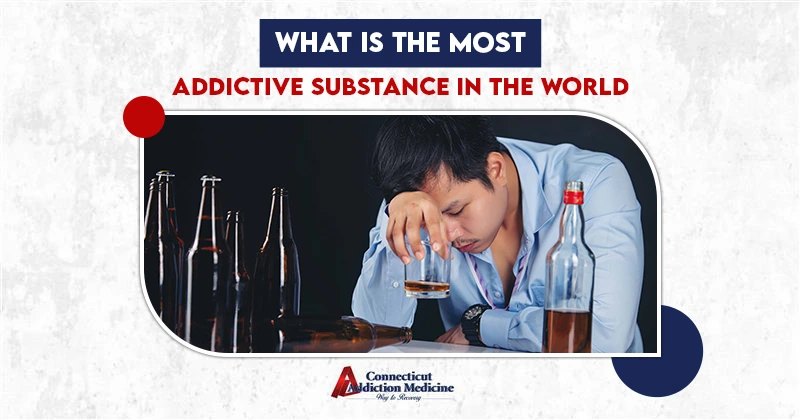When people ask what is the most addictive substance in the world, the answer is not as easy as one drug. Addiction is a complicated process. It is about the brain, body, and environment. Substances change how the brain experiences pleasure and reward
Many experts rank nicotine, heroin, and cocaine as the most addictive drug types. Nicotine is legal in cigarettes, and thus it has become one of the most accessible substances for people to use. Cocaine and heroin are illegal, but they make people addicted very quickly. They are highly addictive drugs because of the speed they change your brain’s chemistry.
You can get hijacked by gambling, food that is high in sugar, and even technological use. Unlike opioids, they do not create physical withdrawal when you stop, but the mental pull can still be very powerful.
Science has proven that addiction is not about willpower weakness. Addiction is based on how the brain responds to repeated use. Substances such as fentanyl, meth, and cocaine all have the ability to completely rewire the brain.
CT Addiction helps patients by providing support and treatment to help them overcome their challenges. Whether it is drugs, alcohol, or behaviourally based addictions, the right support can help recovery happen.
Understanding Addiction
Addiction is a disease that causes real physical changes to the brain’s structure and function. It can impact healthy brain functions including judgment, memory, decision-making as well as behavior.
An addictive substance causes the brain’s reward system to release dopamine, which is called the “feel-good” chemical. That is why drugs like heroin, nicotine, and cocaine are often labeled highly addictive drugs.
People searching what is the most addictive drug in the world, often think of one drug that is worse than the other addiction is a chronic and relapsing disease that disrupts normal functioning and structure of the brain.
Addiction can alter how a person thinks, acts, and feels. A person may use a drug for pleasure, but once a person uses it regularly, their brain begins to rely on that substance.
The Science Behind Addiction
The brain is programmed to pursue pleasure and avoid pain. Addictive substances come along and hijack this system, pulling more dopamine than the brain is equipped to receive. The brain responds to overdose levels of dopamine by reducing its production of dopamine, so the consequence is a person then needs more of the drug to feel normal rather than the high.
This is why cocaine addictive is commonly used terminology in any health discussion. Cocaine puts a massive burst of dopamine in the brain in a hit, so the high is quick and severe, followed by a painful crash. Likewise, with methamphetamine, is meth addictive is a relevant question since it dramatically amplifies mood and energy.
Synthetic opioids including fentanyl present additional challenges. A fentanyl addict experiences severe levels of dependence as well as life risks associated with the nature of the drug.
Ranking the Most Addictive Substances
| Substance | Addiction Risk | Common Effects |
| Nicotine | Very High | Cravings, restlessness |
| Cocaine | High | Energy, euphoria, crash |
| Heroin | Very High | Pain relief, sedation, dependence |
| Fentanyl | Very High | Numbness, drowsiness |
| Alcohol | Moderate–High | Relaxation, dependence |
Why Some Substances Are So Addictive
1. Speed of Effect
Drugs like cocaine act in seconds. The faster the effect, the stronger the addiction.
2. Intensity of Pleasure
Heroin and fentanyl give intense highs. The brain wants to repeat the feeling.
3. Withdrawal Symptoms
Why is cocaine so addictive?
Because stopping it causes depression, fatigue, and craving.
Why is meth so addictive?
It brings extreme energy but leaves the body drained.
Most Addictive Things Besides Drugs
Addiction is not only about chemicals. Some most addictive things besides drugs include:
1.Gambling
Activates the brain’s reward circuits through risk and reward.
2.Sugar
Stimulates dopamine and can cause cravings similar to drugs.
3.Social Media & Gaming
Endless scrolling and gaming loops create compulsion.
4.Shopping
Buying triggers dopamine release, often followed by guilt.
Conclusion
So, what is the most addictive substance in the world today? Some experts say nicotine, heroin, or cocaine are the winners, with fentanyl now being a significant new threat.
Likewise, there are also a considerable number of persons who have behavioral addictions and suffer from withdrawal to gambling, etc. The commonality of the stories each addiction highlights how human and universal the struggles with addiction have been for millenia.
The good news is recovery is possible. Many individuals have recovered from addiction through professional support, therapy and community care. CT Addiction supports patients and provides individualized programming and ongoing recovery support. The goal of CT Addiction is to help a person navigate their way to a different healthy path.
FAQs
Q.Is cocaine addictive?
Cocaine produces severe cravings and dependence..
Q.Is meth addictive?
YES. Meth rewires the brain and produces intense withdrawal symptoms.
Q.What are some of the more addictive things other than drugs?
Some of the more addictive things besides drug use include gambling, sugar, and social media.

